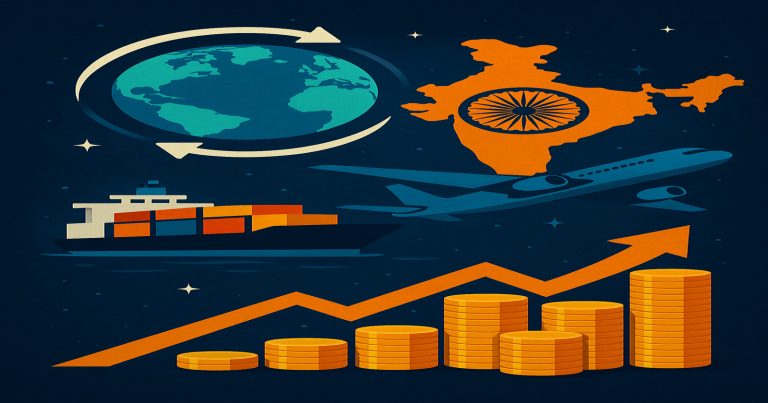Globalization has reshaped economies worldwide. By expanding the integration of merchandise, services, innovation, and capital across borders. In India’s case, the impacts of globalization have been particularly transformative. Especially since the 1991 financial crisis. These changes destroyed the Permit Raj. It invited remote ventures and opened Indian markets to the worldwide economy. Nowadays, globalization is basic to India’s financial development story. Affecting each segment from agribusiness to IT. In any case, this change brings both opportunities and challenges. This article will dissect globalization’s meaning and its effect on the Indian economy. The sector-wise impacts, benefits, and impediments are also covered. Along with how India oversees these energetic changes
What is Globalization?
Globalization increases interconnection and interdependence among countries. Through economic, technological, cultural, and political exchanges. This includes the global movement of goods, capital, information, labour, and technology. It encourages open markets and the breakdown of national barriers. Thereby promoting free trade and international cooperation.
- Social Trade: Globalization leads to the sharing of social values. Building nourishment, craftsmanship, and ways of life across countries. In India, this has brought both differing qualities and Western impact.
- Financial Interdependency: Nations depend on each other for exchange, funds, and assets. India occasionally imports crude oil but sends out pharmaceuticals and computer programs.
- Innovative Dissemination: The web, smartphones, and mechanical computerization spread quickly due to globalization. This makes strides in productivity over Indian businesses.
Historical Background: Globalization in India
Sometime in 1991, India adopted a closed and protectionist financial policy. It forced overwhelming duties, purported authorization, and confinement of outside speculation. This constrained development and advancement led to wasteful aspects and financial stagnation. The adjustment of emergency installments of 1991 constrained India to look for IMF assistance. Thereafter, receive liberalization.
- Financial Emergency of 1991: India’s outside savings fell below $1 billion. The emergency led to clear changes that marked the start of globalization in India.
- Passage into the Worldwide Advertise: Post-reform, India started trading IT administrations and pharmaceuticals. Thereby pulling in noteworthy FDI, particularly in telecom and manufacturing.
Key Highlights of Globalization
Globalization is multifaceted and incorporates a few interrelated highlights. This advances cross-border participation and financial integration. These angles contribute to India’s change into a global economic player.
- Exchange Liberalization: India decreased taxes and standards to advance imports and trade. This permitted Indian businesses to enter universal markets. It also expanded to cheaper imported merchandise.
- Innovative Trade: Globalization has encouraged the sharing of advanced technologies, particularly in AI. Also, counterfeit insights and renewable energy enable Indian businesses to improve and develop.
- Money-related Integration: India opened its capital markets to foreign institutional investors (FIIs). This expanded outside capital, boosting stock markets and subsidising expansive infrastructure ventures.
- Social Merging: Media, music, food, and design from over the globe have become a part of Indian urban life. At the same time, Indian culture, yoga, and Bollywood have gained worldwide ubiquity.
- Labour Portability: The request for gifted Indian experts, especially in IT and healthcare, has expanded worldwide. This led to a rise in settlements and information exchange.
Economic Liberalization in India (1991 Reforms)
India’s 1991 reforms were a turning point in modern Indian economic history. The reforms aimed to stabilize the economy and integrate India into the global market. By reducing government control and encouraging private enterprise.
- Privatization: The government began divesting its share in public sector undertakings. Leading to better efficiency and competitiveness in industries like aviation, telecom, and banking.
- Liberalization: Industrial licensing was abolished, allowing the private sector to flourish. New businesses could enter the market without complex bureaucratic procedures.
- FDI Reforms: India allowed 100% FDI in many sectors like telecom, retail, and real estate. This attracted global giants like Amazon, Walmart, and Samsung.
India’s Reaction to Globalization
India grasped globalization by transitioning from a self-reliant economy to an export-oriented economy. This comes about in expanded outside exchange, speculations, and job openings.
GDP Development: Post-liberalization, India’s GDP has developed from $270 billion in 1991 to $3.7 trillion in 2024. India became one of the world’s best economies.
Send out Boom: Segments like materials, pearls, computer programs, and pharmaceuticals have seen exponential development in worldwide demand.
Benefit Industry Development: India has become the world’s outsourcing capital. With BPOs and IT giants catering to clients worldwide.
Positive Impact of Globalisation
Globalization has contributed to India’s improvement in numerous segments. After opening its economy in 1991, India coordinates more profoundly with worldwide markets. It drives surprising changes in economic development, business, innovation, trade, and consumer lifestyle.
Fast Financial Development
Globalization quickened India’s GDP by pulling in Foreign Direct Investment (FDI). By upgrading international trade and moving forward, institutional systems. With the removal of exchange restrictions and financial liberalization, India became an appealing destination for universal financial specialists. The influx of capital and innovation boosted efficiency. It also boosted mechanical yield. Moving India toward becoming one of the fastest-growing major economies in the world.
Work Generation
One of the most apparent benefits of globalization has been job creation. Companies like Infosys, Wipro, TCS, Amazon, and BPO created millions of jobs, especially for urban youth. This work boom, moreover, had a significant impact on the development of transport and infrastructure. Also, tangible bequests and public services across cities.
Innovation Get to
Worldwide collaboration presented India with progressive innovations across different divisions. From rural biotechnology to 4G telecom systems, Indians picked up instruments that improved proficiency and yield. Ranchers started utilising present-day equipment and better seeds. Whereas companies received computerization and data-driven frameworks, upgrading overall.
Trade Competitiveness
India developed as a worldwide exporter of IT services, materials, pharmaceuticals, and more. With more noteworthy advertising access and universal guidelines, Indian merchandise has become competitive in pricing and quality. Vital exchange approaches and worldwide certifications empowered Indian firms to extend their impression within the global market, fortifying the country’s trade balance.
Progressed Way of Life
Globalization gave Indian buyers a more extensive cluster of universal brands, services, and experiences. Rising earnings, strides made in infrastructure, and superior work openings improved buyer purchasing control. From worldwide quick food chains to universal mold brands, urban India saw a way of life change, stamped by comfort, assortment, and innovation.
Negative Impacts of Globalisation on the Indian Economy
In spite of its different focuses of intrigued, globalization has driven to some challenges. These incorporate creating dissimilarity, common corruption, social shifts, and weight on neighborhood businesses. The benefits of globalization have not been reliably spread, taking off specific bunches at a impediment.
Wage Imbalance
Whereas the taught and talented workforce profited from modern openings, the incompetent and rural population were greatly prohibited. The urban–rural salary crevice broadened, and the financial partition between the wealthy and the destitute became more conspicuous. This disparity frequently translates to unequal access to instruction, healthcare, and social services.
Natural Concerns
The race for mechanical development was driven to discuss water and soil contamination, especially in districts with lax controls. Timberlands were cleared for urban advancement, and common assets were misused at unsustainable rates. Industrialization without appropriate checks and equalizations contributed to climate change and natural degradation in India.
Uprooting of Neighborhood Businesses
Nearby artisans, bungalow businesses, and MSMES (Small, medium, and large enterprises) have survived against the scale and pricing of multinational companies. Numerous conventional enterprises, particularly in handicrafts and handloom divisions, closed down due to the need for competitiveness and demand, resulting in a loss of employment and social disintegration.
Social Disintegration
Worldwide media, excitement, and quick food chains have affected Indian society, especially the youth. Western ways of life, values, and consumerism started suppressing conventional traditions, dress, and eating habits. This move risks India’s social personality, differing qualities, and inborn information frameworks.
Sector-Wise Impacts of Globalisation in India
The effect of globalization changes over diverse divisions of the Indian economy. Whereas IT and fabricating picked up altogether, conventional retail and farming faced both opportunities and challenges.
IT and Computer Program
Worldwide requests for tech arrangements turned India into the world’s IT back office. Companies like TCS, Infosys, Wipro, and others utilized India’s massive pool of tech-savvy experts to supply reasonable, high-quality IT services. Cities like Bengaluru, Hyderabad, and Pune became worldwide tech centers, making employment and contributing to the external trade savings.
Manufacturing
FDI in automobiles, gadgets, FMCG, and material divisions boosted generation and exports. The “Make in India” activity energized worldwide firms to set up manufacturing units in India, making strides in the framework and improving their ability. In any case, nearby producers had to adopt innovation and scale to remain competitive.
Retail
Worldwide, brands such as Walmart, IKEA, and Amazon have entered the Indian market, advertising various items and services. This changed buyer behavior, with individuals moving from conventional kirana stores to organized retail and e-commerce stages. In reaction, numerous nearby stores modernized through computerized payment systems and stock tech.
Education
Globalization brought in instructional changes and introductions. Indian students presently have access to online platforms like Coursera, edX, and Khan Academy and indeed seek after universal degrees through remote college tie-ups. Trade programs and collaborative inquiry have made strides in the quality and reach of instruction in India.
Globalisation and Indian Economy FAQs
1. What is globalization in the context of the Indian economy?
Globalization refers to increasing economic integration between India and the rest of the world through trade, foreign investment, technology, and cultural exchange, particularly after the 1991 economic reforms.
2. When did globalization start in India?
Globalization in India officially began in 1991 with the introduction of the Liberalization, Privatization, and Globalization (LPG) policy package during an economic crisis, initiated by then Finance Minister Dr. Manmohan Singh.
3. What are the positive effects of globalization on India?
Key benefits include increased foreign direct investment (FDI), growth of the IT and service sectors, access to global markets, technological advancement, and job creation in urban areas.
4. What are some challenges of globalization for India?
Globalization has led to widened income inequality, job losses in traditional sectors, cultural homogenization, and greater dependence on global markets, making the economy more vulnerable to global shocks.
5. How has globalization affected India’s agriculture and manufacturing sectors?
In agriculture, globalization exposed farmers to price fluctuations and international competition, while in manufacturing, it brought in foreign companies, increased exports, and put pressure on small-scale industries.


